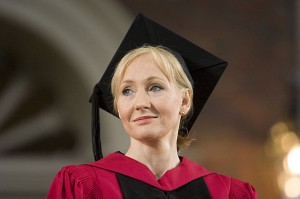 In 2008, J.K. Rowling delivered the commencement address at Harvard on the lessons of failure and the importance of imagination, but not in the ways you’d expect. By now most people are familiar with J.K.Rowling’s rags-to-riches story of how she went from being a single mother on welfare to becoming one of the wealthiest women in the world. Most classics majors probably know that J. K. Rowling graduated from college with a degree in classics.
In 2008, J.K. Rowling delivered the commencement address at Harvard on the lessons of failure and the importance of imagination, but not in the ways you’d expect. By now most people are familiar with J.K.Rowling’s rags-to-riches story of how she went from being a single mother on welfare to becoming one of the wealthiest women in the world. Most classics majors probably know that J. K. Rowling graduated from college with a degree in classics.
Given the role that her major no doubt played in the success of the Harry Potter books (clever Greek- and Latin-based wordplay, a deep familiarity with mythic paradigms, etc.) one might expect that her speech would be another run-of-the-mill “be true to yourself and your passions” type of affairs and that the classical references sprinkled throughout would simply illustrate the ultimate utility of those passions. Instead, she does something far more important.
Here are some excerpts. Hopefully they’ll inspire everyone to read the whole thing. It’s one of the most moving and truly inspiring graduation speeches I’ve ever heard or read.
[My parents] hoped that I would take a vocational degree; I wanted to study English Literature. A compromise was reached that in retrospect satisfied nobody, and I went up to study Modern Languages. Hardly had my parents’ car rounded the corner at the end of the road than I ditched German and scuttled off down the Classics corridor.
I cannot remember telling my parents that I was studying Classics; they might well have found out for the first time on graduation day. Of all the subjects on this planet, I think they would have been hard put to name one less useful than Greek mythology when it came to securing the keys to an executive bathroom.
…
Now you might think that I chose my second theme, the importance of imagination, because of the part it played in rebuilding my life, but that is not wholly so. Though I personally will defend the value of bedtime stories to my last gasp, I have learned to value imagination in a much broader sense… In its arguably most transformative and revelatory capacity, it is the power that enables us to empathise with humans whose experiences we have never shared.
One of the greatest formative experiences of my life preceded Harry Potter, though it informed much of what I subsequently wrote in those books. …I paid the rent in my early 20s by working at the African research department at Amnesty International’s headquarters in London.
…Every day, I saw more evidence about the evils humankind will inflict on their fellow humans, to gain or maintain power. I began to have nightmares, literal nightmares, about some of the things I saw, heard, and read. And yet I also learned more about human goodness at Amnesty International than I had ever known before…Unlike any other creature on this planet, humans can learn and understand, without having experienced. They can think themselves into other people’s places.
…[M]any prefer not to exercise their imaginations at all. They choose to remain comfortably within the bounds of their own experience, never troubling to wonder how it would feel to have been born other than they are…They can refuse to hear screams or to peer inside cages; they can close their minds and hearts to any suffering that does not touch them personally; they can refuse to know…What is more, those who choose not to empathise enable real monsters. For without ever committing an act of outright evil ourselves, we collude with it, through our own apathy.
One of the many things I learned at the end of that Classics corridor down which I ventured at the age of 18, in search of something I could not then define, was this, written by the Greek author Plutarch: What we achieve inwardly will change outer reality. That is an astonishing statement and yet proven a thousand times every day of our lives. It expresses, in part, our inescapable connection with the outside world, the fact that we touch other people’s lives simply by existing.
…The great majority of you belong to the world’s only remaining superpower. The way you vote, the way you live, the way you protest, the pressure you bring to bear on your government, has an impact way beyond your borders. That is your privilege, and your burden.
…
I have one last hope for you… The friends with whom I sat on graduation day have been my friends for life…So today, I wish you nothing better than similar friendships. And tomorrow, I hope that even if you remember not a single word of mine, you remember those of Seneca, another of those old Romans I met when I fled down the Classics corridor, in retreat from career ladders, in search of ancient wisdom:
As is a tale, so is life: not how long it is, but how good it is, is what matters.
HT Clara Hardy